|

photo - mw
_______________________
The Tree of Meaning
Robert Bringhurst
adapted from The Tree of Meaning: Thirteen Talks
(....)
People often notice that language helps them think — and then they sometimes ask, Are there other ways to think besides in language? Doubtless a good question; but that, I think, is not the way to ask it. What the question means is, Are there languages to think in other than the ones in which we talk? And the answer is, Of course! There are the languages of mathematics, the languages of music, languages of colour, shape and gesture. Language is what something becomes when you think in it. Life as we know it thinks, it seems, in nucleic acids. The forest thinks in trees and their associated life forms: asters, grasses, mosses, fungi, and the creatures who move through them, from annelids and arthropods to thrushes, jays and deer. Humans often, but not always, think in words and sentences.
Ideas, according to Marx, do not exist apart from language. Many others say the same. They are asserting that the only way to think is in the speech of human beings. The entire natural world stands as proof that this is false. Yet in a broader sense — a sense that is equally alien both to Marxist and to capitalist values — I suspect the claim is true: where there are ideas, there is language. Mythtellers, however, are prone to remember (and writers to forget) that the languages of words are not the only kind of human language, and that the languages spoken by humans are only a small subset of language as a whole. Some deeply human stories tell us this is so....(more)
Robert Bringhurst
a Canadian poet, typographer and author. He is the author of The Elements of Typographic Style – a reference book of typefaces, glyphs and the visual and geometric arrangement of type. A lifelong student of languages, Bringhurst has translated substantial works from Haida and Navajo, as well as classical Greek and Arabic.
- wikipedia
Thinking and Singing: Poetry and Practice of Philosophy
Edited by Tim Lilburn; introduction by Brian Bartlett reviewed by Adam Dickinson antigonish review
(....)
Robert Bringhurst's contributions to Thinking and Singing are compelling engagements with disciplinary boundaries and with the natural origin and cultural role of myth. In "The Philosophy of Poetry and the Trashing of Doctor Empedokles" Bringhurst argues that we should not see Empedokles as simply a Presocratic cosmologist but also as a practitioner of innovative poetry. Indeed, Bringhurst takes issue with Aristotle's categorization of Empedokles as "a versifier rather than a poet." Of what use, he asks in the essay, is the term "philosophical poetry?" T.S. Eliot's unhelpful insistence that philosophy and poetry remain separate enterprises, with the former confined to the realm of abstraction and the latter to the realm of feeling, have done much to institutionalize a kind of limited taxonomic thinking. As Bringhurst notes:
"The moment we leave the conceptual jail where philosophy and poetry are confined to separate cells, we find ourselves in plenty of good company as well as fresher air. We are free to walk with Lao Zi and with Zhuang Zi, Empedokles, Parmenides…with Nietzsche and with Wittgenstein, Erigena and Pascal - and with many Native American thinkers who may never use any of these terms but in whose practice it is clear that myth is the essential mode of poetry, the essential mode of philosophy, and the link between the two. (The Haida poet Skaay is one especially fine example.)"
The issue of myth, raised here as a potential articulation between poetry and philosophy, is explored again in his second essay "Poetry and Thinking." A myth, for Bringhurst, "is a particular kind of story: a story that thinks about the world and so becomes, in some inherent sense, poetic." He develops his notion of myth through an interesting discussion of culture. Like literature, like pattern, culture is not manmade; the earth, as the ultimate crucible for our education, as original imperative, is the foundation of human culture, black bear culture, bushtit culture, etc: "The culture of nature is the culture all these other cultures are a part of, the culture of the whole which none of the parts can do without." He adds: "The library was here before we were. We live in it." Stories and poetry, therefore, exist around us, as elemental constituents of our earthly culture. Poetry is not the exclusive domain of language, Bringhurst stresses; rather, language is produced in poetry and "stories are the fruit that language bears." "You and I," he suggests memorably, "are stories told in ribonucleic acid."...(more)
Everywhere Being Is Dancing: Twenty Pieces of ThinkingRobert Bringhurst
Reviewed by Zachariah Wells
(....)
Poet, philosopher, translator, linguist, critic, typographer, ethnographer – Robert Bringhurst is a rare sort of person: an independent scholar and a non-specialist. As such, he is just the sort of voice we should be listening to if we are seriously interested in fixing what’s broken in the world. Everywhere Being Is Dancing provides the perfect opportunity to take heed.
In these essays, covering 30-odd years of writing and thinking, Bringhurst discusses a wide range of topics, from literature, myth, and translation (included are brilliant translations that Bringhurst himself has done of Parmenides and of Navajo poet Charlie Mitchell’s poetry), to visual art and typography, pre-Socratic philosophers, and modern-era oral poets. But Bringhurst would balk at any assertion that these are discrete areas of knowledge. The central theme of this book is the unity of things organic and human-made – and Bringhurst preaches what he practises, urging us to discard the false demarcations between poetry and philosophy, between ethics and aesthetics, art and nature, theory and practice....(more)
Nine Visits to the Mythworld: Ghandl of the Qayahl LlaanasIntroduction and translation by Robert Bringhurst google books
Those Who Stay a Long Way Out to Sea
From Nine Visits to the Mythworld, by Ghandl of the Qayahl Llaanas
translated by Robert Bringhurst
"The Sealion Hunter"
Introduction
Robert Bringhurst
From the book Nine Visits to the Mythworld _______________________
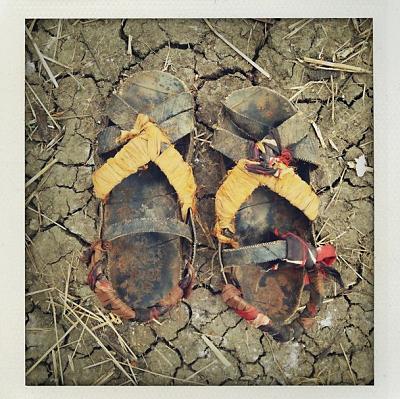
Shannon Jensen
Hipstamatic Revolution
Glenna Gordon
guernica
(....)
In an interview, diCampo said that his choice of tool for this photo is remarkable not because he’s the first photojournalist to take photos with an iPhone—he certainly isn’t—but because he’s using it in an attempt to redefine the way the West sees Africa. His project, Everyday Africa, which includes many but not all of the images featured above, is a collection of iPhone photos taken by a group of photographers working throughout the continent.
(....)
Those arguing against using iPhones for photojournalism say that they trivialize the subject matter, that the level of digital manipulation is unacceptable for a medium that is supposed to document “truth,” and that it turns the photojournalistic reins over to the masses.
“Using InstaHip trivializes the message when used in a photojournalistic context … People might now care a little more about Libya, but they care about it as much as they care about their breakfast,” writes prominent photography blogger and critic Jörg Colberg.
Perhaps the iPhone does trivialize—but in the case of contentious representations of everyday Africa, this is not its weakness but its strength. And for all the reasons that the iPhone fails at traditional photojournalism, perhaps it’s the most radical approach we can use to rethink the way we represent Africa....(more)
_______________________

Lewellyn Wright House
1959
Pedro E. Guerrero
1917 - 2012
_______________________
Ship Write
Isolated for one night in a boat overlooking the Thames, Geoff Dyer explores representations of reality through the lens of Joseph Conrad’s Heart of Darkness.
_______________________
Against Innovation
Simon Waxman
jacobin
If there’s anything Americans love more than expensive outdoor recreation equipment, bacon, and wars of choice, it’s innovation.
(....)
Novelty may be a useful criterion when we judge the success and failure of a creative work. But it shouldn’t be the only criterion, or even emphasized. Just as it shouldn’t be the only or primary watchword in politics and education. Perhaps the solution to the conflict in Israel and Palestine is an old one: democracy for everyone who lives there. Perhaps the solution to the achievement gap is an old one: welfare and affordable childcare, to combat the pathologies bred by poverty in the five years before kindergarten.
But we don’t want to rehash those arguments, do we? We’d prefer to think that those ethical and ideological conflicts aren’t real after all, or are only as real as our imaginations are stunted.
(....)
Will our faith in innovation be rewarded? Will the fetish for new ideas that we see in TED Talks, the Aspen Ideas Festival, the World Economic Forum ideas lab, Obama’s speeches, and the endless stream of idea-of-the-moment journalism at last prove its worth? Maybe. Or maybe it will go on doing principally what it does now: offering the false hope that we will one day conquer exhaustion, frustration, boredom, ourselves....(more)
_______________________
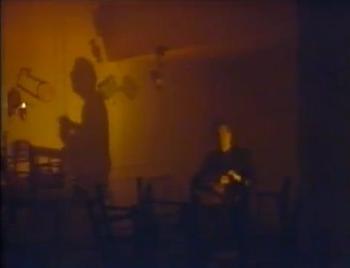
I Am a Hotel
Leonard Cohen's 1983 Musical for Canadian Television
"I Am a Hotel was filmed at the King Edward Hotel in Toronto over a six-day period in April of 1983. It was directed by Allan F. Nicholls and written by Cohen and Mark Shekter. The cast included ice skating champion Toller Cranston as “The Manager,” dancer and choreographer Anne Ditchburn as “The Gypsy Wife,” and Celia Franca, founder of the National Ballet of Canada, as “The Diva.” The film was first broadcast in Canada on May 7, 1984, and although it went on to win a Golden Rose at the Montreux International Television Festival, it has rarely been shown since. The version above is from Dutch television."
— Open Culture
_______________________
the mesh of power
Michel Foucault
Translated by Christopher Chitty
viewpoint
(....)
... the question that I would like to pose is the following: how is it that our society, Western society in general, has conceived of power in such a restrictive, impoverished and negative way? Why do we always conceive of power as law and prohibition, why this privilege? Of course, we could say that all this is due to the influence of Kant, to the idea according to which, in the final instance, the moral law, the “you must not,” the opposition “you must” / “you must not” is, in fact, the matrix of every regulation of human conduct. But, to speak frankly, explaining this with recourse to the influence of Kant is, of course, totally insufficient. The problem is to know whether Kant had such an influence, and why what influence he had could be so strong. Why did Durkheim, a philosopher with vague socialist tendencies at the start of the Third French Republic, rely upon Kant in this fashion when performing an analysis of the mechanism of power in society?
(....)
A society is not a unitary body, in which one and only one power is exercised. Society is in reality the juxtaposition, the link, the coordination and also the hierarchy of different powers that nevertheless remain in their specificity. Marx places great emphasis, for example, on the simultaneously specific and relatively autonomous – in some sense impervious – character of the de facto power the boss exercises in a workshop, compared to the juridical kind of power that exists in the rest of society. Thus, the existence of regions of power. Society is an archipelago of different powers.
(....)
It appears to me, in fact, that if we analyze power by privileging the State apparatus, if we analyze power by regarding it as a mechanism of preservation, if we regard power as a juridical superstructure, we will basically do no more than take up the classical theme of bourgeois thought, for it essentially conceives of power as a juridical fact. To privilege the State apparatus, the function of preservation, the juridical superstructure, is, basically, to “Rousseauify” Marx....(more)
Viewpoint Magazine issue 2: theory and practice
via
I cite
_______________________

photo - mw
_______________________
The Gospel of L'Arrźt de mort
Kevin Hart
excerpt from Kevin Hart's forthcoming book The Dark Gaze: Maurice Blanchot & the Sacred from the University of Chicago Press
(....)10.
Resurrection, for Blanchot, is both beholden to death and utterly ignorant of what death truly is. It draws its force from death considered as negativity, while disregarding its obscure dimension: a dying that never begins and never ends but eternally repeats itself and therefore dissimulates "itself". To affirm resurrection from the dead would be not to acknowledge the eternal return of dying. This anterior or impossible death never offers itself to comprehension, although one can become vaguely aware of it when suffering or pointlessly waiting. We cannot experience dying, for we come upon it only when there is no ground, no traction, for consciousness to take hold. Yet its sheer alterity dangles before us the thought of having an experience par excellence. The thought is delusory; at most, dying interrupts us, puts us to the test, but it can never be lived in the present. Indeed, it disperses the present and undoes any assurance we might have in the unity of the "I". Frightful as this dying might seem, it is to be affirmed, Blanchot tells us in a récit, for it announces "the renunciation of mystery, the ultimate insignificance of lightness". If death enters into the life of the concept, dying declines any invitation to take part in either comprehension or history; it does not abolish the particular but, as it were, hails its singularity while not being able to speak of it....(more)
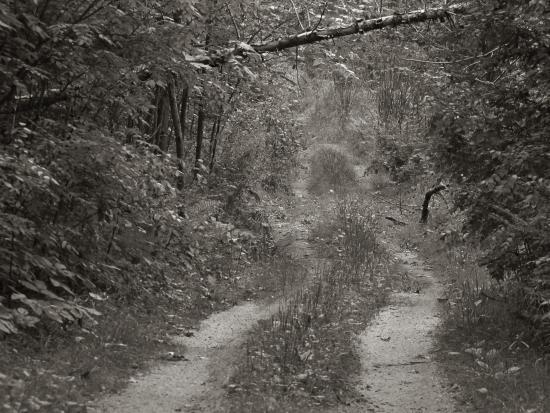
photo - mw
_______________________
Paper Dreams
for Jerome Rothenberg
Arkadii Dragomoshchenko
Translation from Russian by Genya Turovskaya
(....)
The letter dreams of the same
paper's rustling,
in which hearing distinguishes
the contours of a poet,
who dreams of Hasidim
burning out as a page of song
on the stones of the ocean,
reducing vowels to gesture.
The dream dreams a dream of consonants,
the page--
where black assumes
the limits of incision--
dreams of the borders of the letter, mica, light.
...(more)
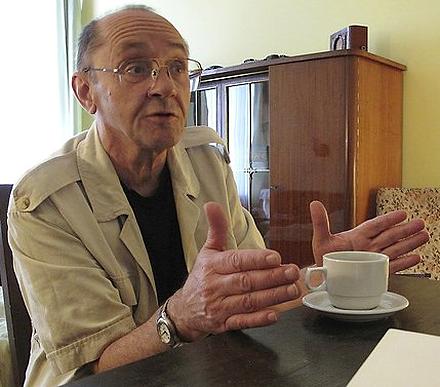
Arkadii Dragomoshchenko
(1946-2012)
photo by Susanne Christensen 1 2
Here and There: Some Reflections on Translating Arkadii Dragomoshchenko
Evgeny Pavlov
From Phosphor
Arkadii Dragomoshchenko
Trans. Lyn Hejinian and Elena Balashova
Habits of mind result from a redistribution of the places on which the eyes fall. Yes, I'm probably right about this. What I'm thinking about at this particular moment allows me to assume so. A rusty rat crossing the street. A soft, interminable twilight, and above it the night lights burning. The room in which we lived was almost eighteen meters long. In the mornings, on streets billowing steam, I went around the corner, bare foot but for sandals, to drink a cup of hot milk and eat cheese pastry. Liteiny Prospekt was blinding. I shuffled along in unbuckled sandals. Amid mocking seagulls and love cries. Through a courtyard to the Fontanka, passing the library, toward the circus, the bridge. This is about many things. It's about emigration. About T.S. Eliot and Turgenev. But what are you thinking about? What did or what does your life consist of? I like your question. In the kitchen in a glass jar she kept demons (warring with cockroaches) which she fed with poppyseeds. Your question comes at absolutely the right moment, although it makes me slightly nauseous, the way roses or moldy dolls might--vertigo. By evening my skin stung from the sun. It happened the first time on an anthill. They rushed frantically toward the river. As if through a magnifying glass. In the future, if he's to recount a couple of the plots that interest him (let's suppose), he will have to get rid of her. But of whom, one wants to know! History? Geometry? Mental habits? One of these plots begins with a murder....(more)
_______________________

Street of Crocodiles
directed by Timothy and Stephen Quay
1986
youtube 29:33
The Quays’ masterpiece, Street Of Crocodiles is adapted from a short story by Polish writer Bruno Schulz, and was their first film shot on 35mm. A museum keeper spits into the eyepiece of an ancient peep-show and sets the musty machine in motion, plunging the viewer into a nightmarish netherworld of bizarre puppet rituals among the dirt and grime.
— Zeitgeist Films

_______________________
After the Last Man: Images and Ethics of Becoming Otherwise
Elizabeth A. Povinelli
e-flux
Politics and art, like forms of knowledge, construct “fictions,” that is to say material rearrangements of signs and images, relationships between what is seen and what is said, between what is done and what can be done … They draft maps of the visible, trajectories between the visible and the sayable, relationships between modes of being, modes of saying, and modes of doing and making.
—
—Jacques Rancičre, The Distribution of the Sensible
Huddled within one of the most influential theories of human desire and the destiny of democracy is an image of history and its future. This image is of a horizon. In lectures delivered at the École Pratique des Hautes Études from 1933 to 1939, Alexandre Kojčve argued that the horizon of universal human recognition (“democracy”) was already in the nature of human desire but, paradoxically, had to be achieved through concrete struggles that intensified political life. These struggles were dependent on and waged against the background of human finitude. Yet, at the end of these battles, when the horizon had been breached, the world and the humans within it would be a form of the undead.
What was the future of this image? And what is its future now? Is it “huddled within,” or is it the architectural framework on which affective and institutional futures were built and now face us? What other imagistic architecture of human being and politics might have made an alternative history and future of political action? Here I extend a set of thoughts first published in a previous essay on a very different image and grammar of social and political life—the bag and embagination.2What would happen if we replaced the transcendental architecture of the horizon with the immanent architecture of embagination? And how is embagination not replacing other images of immanent becoming—the fold and the rhizome—but rather confronting them....(more)
_______________________

photo - mw
_______________________
Political Writings, 1953-1993
Maurice Blanchot
translated by Zakir Paul
google books
pdf available at aaaaarg - free reg. req.
Refusal
At a certain moment, when faced with public events, we know that we must refuse. Refusal is absolute, categorical. It does not discuss or voice its reasons. This is how it remains silent and solitary, even when it affirms itself, as it should, in broad daylight. Those who refuse and who are bound by the force of refusal know that they are not yet together. The time of common affirmation is precisely what has been taken away from them. What they are left with is the irreducible refusal, the friendship of this sure, unshakable, rigorous No that unites them and determines their solidarity.
The movement of refusal is rare and difficult, though equal and the same in each one of us, as soon as we have taken it up. Why difficult? Because we must refuse not only the worst but also a reasonable semblance, a solution that will be deemed happy and even unhoped for. In 1940 refusal had to be asserted not against the invading force (not accepting it was self-evident) but against the chance that Marshal Pétain claimed, no doubt in good faith, to represent and against all the justifications he was able to invoke. Today, the exigency of refusal has not arisen in relation to the events of May 13 (which are refused by themselves), but in the face of this power that claimed to reconcile us with them honorably, by the mere authority of a name.
What we refuse is not without value or importance. This is precisely why refusal is necessary. There is a kind of reason that we will no longer accept, there is an appearance of wisdom that horrifies us, there is an offer of agreement and compromise that we will not hear. A rupture has occurred. We have been brought back to this frankness that does not tolerate complicity any longer.
When we refuse, we refuse with a movement free from contempt and exaltation, one that is as far as possible anonymous, for the power of re- fusal is accomplished neither by us nor in our name, but from a very poor beginning that belongs first of all to those who cannot speak. Today, one might say that it is easy to refuse, that the exercise of this power carries little risk. This is no doubt true for most of us. I think, however, that refusal is never easy, that we must learn how to refuse and to maintain intact this power of refusal, by the rigor of thinking and modesty of expression that each one of our affirmations must evidence from now on. _______________________

photo - mw
_______________________
The Man Who Rode the Mule Around the World
Jordan Davis
(....)
A continuous stream of information
Broadcast by the insects:
At the sound of the tone,
Please leave a message.
Ah, they will think.
No one home.
It's good for them to think—
Don't do it for them.
Feel free to shout at the screen.
Feel as free as possible.
Feel freer.
...(more)
Jordan Davis' Equanimity at 10
_______________________

photo - mw
_______________________
The New Politics of Nostalgia
E.J. Dionne, Jr.
thruthout
A specter is haunting the affluent societies of the West. Across the rich countries, and across the political spectrum, there is an unstated but palpable longing for a return to the 1950s.
This ‘50s nostalgia takes different forms on the left and on the right. For progressives, the backward-looking wish is for the shared and growing prosperity when unions thrived and could enforce a relatively egalitarian social contract. Democrats in the United States and Social and Christian Democrats in Europe created systems of social insurance—they were more robust in Western Europe—that were largely endorsed by political conservatives.
On the right, ‘50s nostalgia takes the form of a quest for order, social homogeneity, religious faith—or, at the least, public respect for traditional values—and strong families, sometimes defined as a return to old gender roles and a less adventurous approach to sexuality.
Neither side fully acknowledges its own nostalgia, partly because everyone wants their 1950s a la carte.
(....)
In the end, of course, nostalgia is a dangerous form of politics and a kind of lie. The fact that left and right alike are ambivalent about the 1950s, albeit in different ways, suggests that bringing them back whole is not in the cards.
And it’s not possible, which is why nostalgia is always a poor guide to the future....(more)

photo - mw
_______________________
. . . was dipped in Hoily Olives and chrysmed in Scent Otooles; hears cricket on the earth but annoys the life out of predikants; still turns the durc's ear of Darius to the now thoroughly infurioted one of God; made Man with juts that jerk and minted money mong maney . . .
—
James Joyce, out of Finnegans Wake (1939)
Cricket
assembled by John Latta Isola di Rifiuti
What more is there to love than I have loved?
And if there be nothing more, O bright, O bright,
The chick, the chidder-barn and grassy chives
And great moon, cricket-impresario,
And, hoy, the impopulous purple-plated past,
Hoy, hoy, the blue bulls kneeling down to rest.
Chome! clicks the clock, if there be nothing more.
—
Wallace Stevens, out of “Montrachet-Le-Jardin”
...(more)
_______________________
Three poems
Jason Zuzga
drunken boat
Therapeutic Aesthetics
That blue swirl with the twinkling lights
is my anxiety about money.
The red slash with hairs
is my anxiety about my health.
The orange crescent is my anxiety
about my family members—what
are they doing now. Are they Okay.
I'll reduce them to dots.
Stomach surgery is reduced
to one bitter flavor, a snifter
of swirling herbal fumes.
The dots swell in my brain
as I recline by the window—my
brother walks down the street
to his lab, my mom pours
hot water. I look at the orange
pulse of brushwork.
I can see the steam
as the people run hollering
along the cold sand.
The eye of the beached pilot
whale reduces to one pixel.
I rolf its struggled breath
to a stretch of slivered line.
I walk along the silver line to get some coffee.
I feel the black bile rise in my throat.
I slide the bile into its proper place:
one of four corresponding humours.
One hundred years from now
I will not exist, I remind myself.
I place that thought through the mouth
of a tall glass vase, a pool of filtered
water. I watch it bloom and wilt.
I watch my face distorted in the bulb.
...(more)
Jason Zuzga at PennSoundMore poems 1 2 3
_______________________
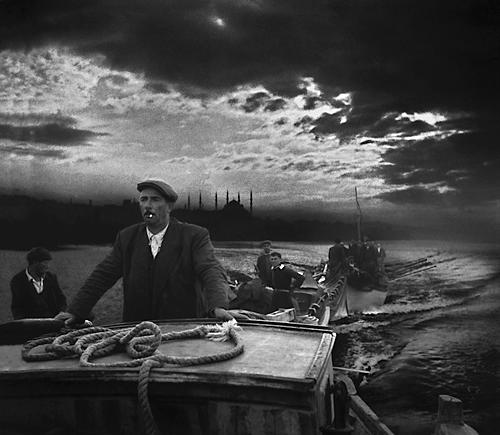
Ara Güler
_______________________
George Washington
Steve Himmer
What he can’t help but remember are the snows that swallowed a man to his heart if he stood still to let the storm rage. Those last silent seconds — save wind and save wolves and save echoing explosions of branches with ice in their veins, save tooth-grinding chatter and snorting hot horses and rattling canteens and rifles of a detachment at last come to rest — those last silent seconds he saved for himself. On the threshold at Presque Isle in his frozen greatcoat, preparing to knock, to announce himself as if those inside didn’t already know he was there. Composing his speech with words rough in those days as an uncarved bit of blowdown picked up and brushed clean and used in lieu of silver spoons.
Then ushered into rooms where the old world of Paris sat transported to the wild Ohio — velvet and silk, perfume and powder — and into negotiations that led straight to war in language not one word his own, his mouth full of commands from afar to push the fort-building French off the map: The Lands upon the River Ohio, in the Western Parts of the Colony of Virginia, are so notoriously known to be the Property of the Crown of Great Britain …
Nothing to say for himself and no need to say it; he wasn’t there to sign his own name. He accepted reply and turned back to Virginia across those ridiculous rivers and swallowing snows. Along a route that made sense unfurled over wine stains on some London table but here on the ground, where wine was blood, that map offered one invitation to death on the heels of another: ...(more)
Forty-Four Stories about Our Forty-Four PresidentsMobylives
Every Tuesday right up to Election Day Melville House is presenting stories that creatively interpret the legacies of the men who’ve held this land’s highest office.
_______________________
White supremacy: The real ‘homegrown’ terrorism
Susan Brooks Thistlethwaite
Masculinity and Mass Violence
The ‘Intimate Enemy’ We Refuse to Name
Elizabeth Drescher
 (....) (....)
Of course this focus on masculinity and violence makes many people uncomfortable; particularly men, and perhaps especially those who are not chest-thumping, gun-toting, Christianist, racist extremists. For many women, and others who have a wide range of warm and respectful relationships with wonderful men, tagging cultural constructions of masculinity as factors in this kind of violent rage is troubling. Yet we cannot begin to address the culture of violence that is literally exploding all around us without acknowledging that “manning up” in American culture too often involves actions aimed at the subordination of others—women, children, nature—to the will of a man who, it is assumed, embodies the will of God. These often religiously informed, institutionalized, and naturalized versions of masculinity play no small part in the continuum of violence that moves from the domestic sphere to the public arena. ...(more)
_______________________
Growth Is the Problem
Chris Hedges
The ceaseless expansion of economic exploitation, the engine of global capitalism, has come to an end. The futile and myopic effort to resurrect this expansion—a fallacy embraced by most economists—means that we respond to illusion rather than reality. We invest our efforts into bringing back what is gone forever. This strange twilight moment, in which our experts and systems managers squander resources in attempting to re-create an expanding economic system that is moribund, will inevitably lead to systems collapse. The steady depletion of natural resources, especially fossil fuels, along with the accelerated pace of climate change, will combine with crippling levels of personal and national debt to thrust us into a global depression that will dwarf any in the history of capitalism. And very few of us are prepared....(more)
_______________________
Politicopsychopathology
Neurotocrats vs. the Grand Old Psychosis
Benjamin Kunkel
n+1
_______________________
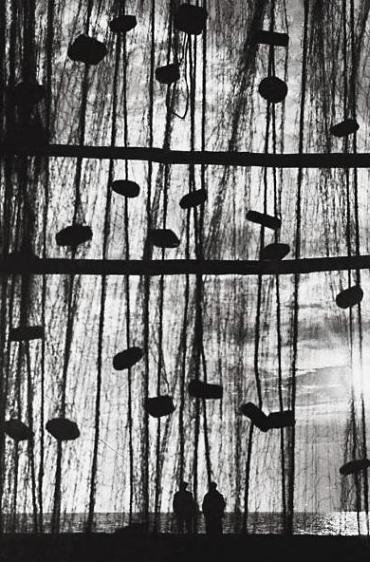
Kumkapi fishing nets
Istanbul, 1950
Ara Güler
1 2
Lost Istanbul
1950s and 60s
Ara Güler
Lens Culture
_______________________
The Last Words of Dutch Schultz
Outsider Poems: A Mini-Anthology in Progress (45)
Jerome Rothenberg
3
I know what I am doing here with my collection of papers, for crying out loud. It isn’t worth a nickel to two guys like you or me, but to a collector it is worth a fortune; it is priceless. I am going to turn it over to . . . . Turn your back to me, please, Henry. I am so sick now. The police are getting many complaints. Look out. Hey, Jack; hello Jack. Jack, mamma. I want that G-note. Look out, for Jimmy Valentine, for he is an old pal of mine. Come on, Jim, come on Jimmie; oh, thanks. O.K. O.K. I am all through; I can’t do another thing. Hymie, won’t you do what I ask you this once? Look out! Mamma, mamma! Look out for her. You can’t beat him. Police, mamma! Helen, Mother, please take me out. Come on, Rosie. O.K. Hymes would do it; not him. I will settle . . . . the indictment. Come on, Max, open the soap duckets. Frankie, please come here. Open that door, Dumpey’s door. It is so much, Abe, that . . . with the brewery. Come on. Hey, Jimmie! The Chimney Sweeps. Talk to the Sword. Shut up, you got a big mouth! Please help me, Henry. Max come over here . . . . French Canadian bean soup . . . I want to pay, let them leave me alone. . . .
...(more)

photo - mw
_______________________
Three poems from “Fire Exit”
Robert Kelly
(....)
78.
The woods green moveless sea
click of wood clirr of leaf
insects at their never-ending plainchant offices
no Palestrina to relieve the rise the flex the fall
of what is permanent
and yet it moves
but how do you know, he said,
what Homer’s ocean sounded like to him
your Latin’s rusty and your Greek’s been repossessed
sometimes you hear what fleshy Virgil heard
sometimes you guess
sometimes you pick a letter and become it
like a girl in a casino tricked to choose a card
by some devious entertainer with more sleeves than arms
says here you are, the Three of Diamonds,
there is no alphabet in wood
in woods
I am alone
...(more)
.....................................................
Finding the measure is finding the
specific music of the hour,
the synchronous
consequence of the motion of the whole world.
— Robert Kelly
A Map That Never Stays the Same
John Yau
(....)
Robert Kelly breaks rule 3 (Sun Tzu's Sixth Century treatise, The Art of War)
under the Section titled Maneuvering: “When you surround an army, leave an outlet free. Do not press a desperate foe too hard.”
It is a rule that realist writers of every stripe have memorized, whether they know it or not. They do not want to write a sentence that stands by itself, with no outlet, isolated from home, and with no place to go to next. The realist gets on the uptown IRT at the bottom of Manhattan and minutes or years later he gets off. It can be 42nd street or El Dorado, a place made only of words but that is as real as any world is.
“I live in an old house that has no address,” Robert Kelly tells us at the outset of his prose meditation, A Line of Sight. The reader wonders what can possibly come next. How will the writer get himself out of this cul-de-sac? This is the question I asked when I first read A Line of Sight.
We live in time. A Line of Sight is different from when I first read it more than thirty-five years ago and, needless to say, so am I. This is my first attempt to map a small territory of Kelly’s that I have explored many times over the years, but until now I have written almost nothing down about my travels there....(more)
_______________________

photo - mw
_______________________
Meditation on a Thought of Antin's (Second Hand)
Bill Lavender
moria
(....)
but in the wood itself
purged for the oldest of reasons
like a scribe
assigned by the king to encode
the secret documents
the library the maps to the treasure
as to be unintelligible to their enemies
who, as anticipated, storm the castle that night
and kill of course first the defenseless scribe
and throw his body on the fire with the key still in his
pocket and they take the encrypted library
make it the basis of their science
build on it, add to it for two thousand years
a problem with
i n t e r p r e t a t i o n
an interpenetration of codes
guides by vanities
the meaningless milked
for every drop while the meaning
melted on the fire
hermeneutics, in other words
in
other
words
what might once have been called
words
& i have no desire to return
to a discourse that forces force by habit
the clacking of word on word each
a call to battle
no matter the meaning
though like these line breaks
and funny
spacings (so hard to under
stand) which, formally or utterly,
breaks a bond and strikes no blow
...(more)
Selections from Transfixion by Bill Lavender big bridge
Bill Lavender in eratio and fieralingue
_______________________
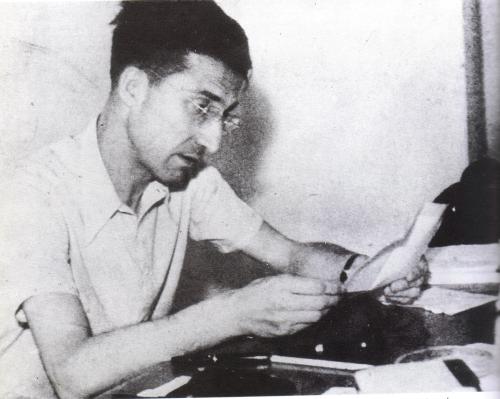
Cesare Pavese
b. Sept. 9, 1908
Cesare Pavese
translated by Linh Dinh
milk
End of Fantasy
This body won't start again. Touching his eye sockets
one feels a heap of earth is more alive,
that the earth, even at dawn, does not keep itself so quiet.
But a corpse is the remains of too many awakenings.
We only have this power: to start
each day of life—before the earth,
under a silent sky—waiting for an awakening.
One is amazed by so much drudgery at dawn;
through awakening within awakening a job is done.
But we live only to shudder
at the labor ahead and to awaken the earth one time.
It happens at times. Then it quiets down along with us.
...(more)
Reading Cesare Pavese
John Taylor CONTEXT N°10
(....)
Of what is a writer’s suicide emblematic? Of writing’s inability to save a life? Ardent lovers of literature may even find it hard to believe that a talent like Pavese’s could not somehow have kept on producing, plunging anew into the toils of composition as a way of resolving perfunctorily (or at least of putting off) the comparatively minor problems of unrequited love and daily living. But of course I am waxing ironic. It is arresting and, I daresay, grimly informative that Pavese’s extraordinarily lucid and pessimistic diary is entitled Il mestiere di vivere (1952), a book translated into English as This Business of Living and all too significantly emphasizing the "métier" or "trade" of living—as in, say, "Mastering the Trade of Living."...(more)
This Business of Living: Diaries, 1935-1950Cesare Pavese google books
_______________________
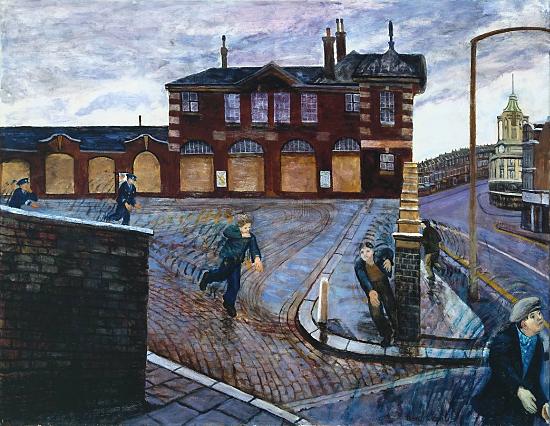
Clapham Junction
1978
Carel Weight
b. Sept. 10, 1908
_______________________
A Translation of Die Berühmten by Thomas Bernhard
by Douglas Robertson
(....)
BASS
Nowadays singing is done on an assembly line
everybody sings and acts from the assembly line
picks up a pheasant bone
a single colossal exercise in mass production
pseudomusical
looks at the clock
Gundi is standing me up
An instigatress of stirs and sensations
One cannot sing Ochs
two hundred times with impunity
two hundred times
Between Salzburg and Bayreuth
the whole thing went slowly but surely
to wrack and ruin
Of course I’m constantly saying to Gundi
do the sensible thing
bale out of your contract
your voice was ruined for good a long time ago
But she is impervious to reason
PUBLISHER
And a charming person
BASS
An utterly
pathological soul
And the greater the talent
the more total its annihilation
picks up another pheasant bone and gnaws at it
...(more)
_______________________
The Art of Translation: Alexander Kuprin’s The Duel
Josh Billings
mobylives
(....)
I have no idea if all translators try to establish (or imagine) these kinds of psychologies for their authors; but I do know that, when it comes to the actual line-to-line work, the question of identity can get significantly stickier. Myths are electric and therefore tidy; but my rough translations of The Duel looked like a battlefield, with nouns, verbs, participles all scattered over the plain like so many limbs. Piecing a single body back together from this mess would require a Frankensteinian ingenuity; so I followed the good doctor’s example, and graverobbed. I plundered literary history, loading my sack with the bones and sinew. In order to guage their appropriateness for my task, I had to work by resemblances, meaning via my overriding sense and impression (shifting as these may be) of Kuprin as a writer. So, like Kuprin’s contemporaries, I found myself answering the question of who he was with musings on who he was like....(more)
_______________________
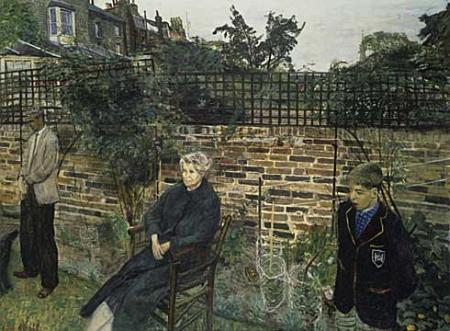 silence
Carel Weight
_______________________
“And then we cowards”
Cesare Pavese
Translated by Geoffrey Brock
And then we cowards
who loved the whispering
evening, the houses,
the paths by the river,
the dirty red lights
of those places, the sweet
soundless sorrow—
we reached our hands out
toward the living chain
in silence, but our heart
startled us with blood,
and no more sweetness then,
no more losing ourselves
on the path by the river—
no longer slaves, we knew
we were alone and alive.
_______________________
Digital Curation and the Cloud [pdf]
Final Report
Brian Aitken, Patrick McCann, Andrew
McHugh, Kerry Miller
Produced by the Digital Curation Centre for
JISC's Curation in the Cloud Workshop
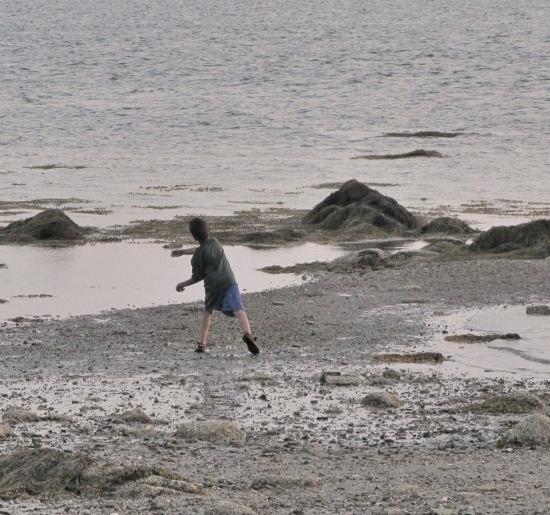
photo - mw
_______________________
Listening
Jean-Luc Nancy
translated by Charlotte Mandell
Assuming that there is still sense in asking questions about the limits, or about some limits, of philosophy (assuming, then, that a fundamental rhythm of illimitation and limitation does not comprise the permanent pace of philosophy itself, with a variable cadence, which might today be accelerated), we will ponder this: Is listening something of which philosophy is capable? Or—we’ll insist a little, despite everything, at the risk of exaggerating the point—hasn’t philosophy superimposed upon listening, beforehand and of necessity, or else substituted for listening, something else that might be more on the order of understanding?
Isn’t the philosopher someone who always hears (and who hears everything), but who cannot listen, or who, more precisely, neutralizes listening within himself, so that he can philosophize?
Not, however, without finding himself immediately given over to the slight, keen indecision that grates, rings out, or shouts between “listening” and “understanding”: between two kinds of hearing, between two paces [allures] of the same (the same sense, but what sense precisely? that’s another question), between a tension and a balance, or else, if you prefer, between a sense (that one listens to) and a truth (that one understands), although the one cannot, in the long run, do without the other?
It would be quite a different matter between the view or the vision and the gaze, the goal or contemplation of the philosopher: figure and idea, theater and theory, spectacle and speculation suit each other better, superimpose themselves on each other, even can be substituted for each other with more affinity than the audible and the intelligible, or the sonorous and the logical. There is, at least potentially, more isomorphism between the visual and the conceptual, even if only by virtue of the fact that the morphe, the “form” implied in the idea of “isomorphism,” is immediately thought or grasped on the visual plane. The sonorous, on the other hand, outweighs form. It does not dissolve it, but rather enlarges it; it gives it an amplitude, a density, and a vibration or an undulation whose outline never does anything but approach. The visual persists until its disappearance; the sonorous appears and fades away into its permanence.
_______________________

photo - mw
_______________________
Rudder
assembled by John Latta
Isola di Rifiuti
*
I also saw a fleet of canal-boats—a wilderness of domesticity. They lay like villagers and greenhorns in the water—the tide bounced them about like huge, clumsy logs. I could not help being a bit contemptuous. A dead cat lay under the rudder of one. Nearby was a little butterfly hunting sustenance. Silly jumble!
-
Wallace Stevens, out of a 3 August 1900 journal-entry (Letters of Wallace Stevens, 1966)
*
For it is certain that you will rise from the bench a new person, and even before you have emerged into the full daylight of the street you will feel that a change has begun to operate in you, within your very fibers and sinews, and when the light of the street floods over you it will have become real at last, all traces of doubt will have been pulverized by the influx of light slowly mounting to bury those crass seamarks of egocentricity and warped self-esteem you were able to navigate by but which you no longer need now that the rudder has been swept out of your hands, and this whole surface of daylight has become one with that other remembered picture of light, when you were setting out, and which you feared would disappear because of its uniqueness, only now realizing that this singleness was the other side of the coin of its many-faceted diversity and interest, and that it may be simultaneously cherished for the former and lived in thanks to the versatility of the latter.
-
John Ashbery, out of “The System” (Three Poems, 1972) *
...(more)
_______________________
About the Village
Ernest Wichner
translated by Rosmarie Waldrop
Asymptote
(....)
Strange village words were gathered into strange sentences
according to the strange village grammar and communicated
by the strange village speakers in their strange village intonation
to equally strange village listeners and in strangely explicable ways
understood by them which was proved irrefutably and village-wide
by their strange village replies
*
In moments of village poetry one behaved
as in village legends and in moments of village surfeit
as in village reality which led by village logic
to unending marriages, births and murders
(....)
And so everything had been steamed down, shrunk down
to a kind of fruit extract and nobody thought of anything but
finding the eye of the needle where you suddenly reach
the reverse of all gestures and could counterbalance the world
with a straw which we practiced until it broke
*
Somewhere deep down the sun was shining and I was
so much myself I could read the time on the round disk
that had neither numbers nor hands that I could entrust
my gestures and movements to the mechanical ballet
with the title identity which however I noticed only later
when I was already sitting in my seat calmly watching it
also it was shortly before that I had learned to pronounce
the word I
...(more)
_______________________

1912 bookmobile
( Western Maryland Regional Library / September 5, 2012 )
100 years of bookmobiles
_______________________
From Fortino Sįmano (the overflowing of the poem)
By Virginie Lalucq and Jean-Luc Nancy
Translated by Sylvain Gallais and Cynthia HogueWords come back to you like ghosts with their insults the first formed
sentences forming a language your language onelanguage which
returning returns you to words
Language comes back, drawn from an absolute immemoriality, from a past forever bygone, to which it nevertheless, passing through the opening, returns. The first sentences, the invention of binding, of holding, of setting word next to word, the modulation mine, that which one calls phrasing, my style, my tone, the inimitable, the absolute uniqueness of my intonation, of my inclination. What the theorists of “genre” have sought in vain with restless fervor: whether I have been speaking in a genre high, middle, or low, in pure diegesis or in pure or mixed mimesis, in epic, tragic, comic, lyric or didactic . . . How, yes, how are you yourself speaking?
But language comes back to the words: this is both more severe and more difficult. Words alone, released into parataxis, uttered as insults, that is, causing harm. The word harms the thing and harms my desire to speak. But it comes back, it haunts my days and silences. It troubles me. September 2012 TWO LINES Online
Center for the Art of Translation
_______________________
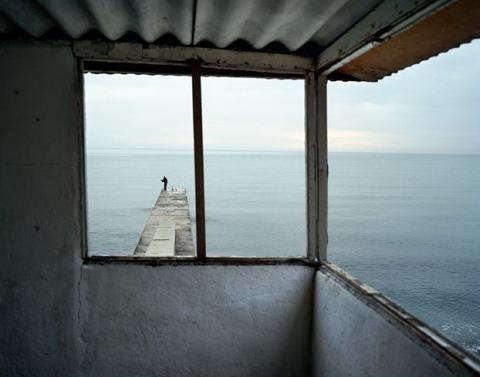
black sea of concrete
Rafal Milach
Interview with Rafal Milach
_______________________
Why We Let Politicians Lie.
The Difference Between Being Lied TO, and Lied FOR
David Ropeik

photo - mw
_______________________
Kafka’s Wound
Will Self
(....)
If anything is gapingly obvious, it’s associative thinking, unless, that is, like Kafka (and myself), you have come to suspect still more the metaphor’s detachment from, and modification of, its metaphrand. The fugitive quality of Kafka’s seeming metaphors, which, in common with the directives of the Castle’s inexorable bureaucracy, are ‘as shy as young girls’, must derive in part, as one of his translators, Joyce Crick, has observed, from the near obsolescence of the subjunctive in contemporary English. In Kafka’s German it is omnipresent: it always seems to be the case that such-and-such was, which is by no means the same as the wooden modality of ‘would’, let alone the bedevilling similitude implied by ‘as if’ and its sluttish coeval ‘like’. ...
(....)
Hannah Arendt said of Walter Benjamin: ‘his basic approach, decisive for all his literary studies, remained unchanged: not to investigate the utilitarian or communicative functions of linguistic creations, but to understand them in their crystallised and thus ultimately fragmentary form as intentionless and noncommunicative utterances of a “world essence”.’ Benjamin was the first ranking critical theorist to survey the corpus delicti, and he had the gift of thinking poetically about this ‘world essence’, rather than seeking to define it in terms of a system; after him have come legion upon legion of Kafka interpreters, who, far from thinking poetically, think prosaically and instrumentally both about his work and their own interpretations. Reaching the head of a lengthy queue, they zip their symbolic order into Kafka’s and then bungee jump into the oblivion of academic publication, bouncing back up to receive tenure. As for these symbolic orders, they are not personally striven for, but issued off-the-peg courtesy of their own university educations. Everyone understands that this state of affairs is a scandal, and an abuse of scholarship that makes the pinpoint deliberations of medieval schoolmen appear positively utilitarian....(more)
_______________________
Why we don't understand Kafka
Gabriel Josipovici
(....)
“Impatience led to our expulsion from paradise”, wrote Kafka in one of his aphorisms, “and impatience stops us returning.” The besetting sin of the Kafka critic is impatience, the need to locate the mystery and then solve it, as it were, the need to move, like the man in that early story, across the text from beginning to end, not stay with it, savour it, allow it slowly to come into focus. To do this we have first of all to recognize that the best way in to Kafka is not via an idea – Kafka and mysticism, Judaism, the insurance business or the condition of modernity – but via his unique way of approaching his material....(more)
_______________________

Traveling Library Station
1897
The Wisconsin Free Library Commission
Wisconsin Historical Images
Wisconsin Historical Society
_______________________
Library as Platform
David Weinberger
... think of a library not as a portal we go through on occasion, but as infrastructure that is as ubiquitous and persistent as the streets and sidewalks of a town, or the classrooms and yards of a university. Think of the library as co-extensive with the geographic area it serves, like a canopy, or as we say these days, like a cloud.
But there’s another, and I think more important, reason to think about libraries as platforms: it focuses our attention away from the provisioning of resources to the foment those resources engender. A library as platform would give rise to messy, rich networks of people and ideas, continuously sparked and maintained by the library’s resources. A library as platform is more how than where, more hyperlinks than container, more hubbub than hub.
(....)
Conceiving of the library as a platform not only opens a range of new services and provides for a continuous increase in the library’s value, it also does something libraries urgently need to do: it changes the criteria of success. A library platform should be measured less on the circulation of its works than in the circulation of the ideas and passions these works spark — from how many works are checked out to the community’s engagement with its own grappling with those works. This is not only a metric that libraries-as-platforms can excel at, it is in fact a measure of what has always been the truest value of libraries....(more)
_______________________

photo - mw
_______________________
I want the material of things. Humanity is drenched with humanization, as if that were necessary; and that false humanization trips up man and trips up his humanity. A thing exists that is fuller, deafer, deeper, less good, less good, less bad. Yet that thing too runs the risk, in our coarse hands, of becoming transformed into ‘purity,’ our hands that are coarse and full of words.
-
Clarice Lispector, The Passion According to G.H.
Too Foreign
Brad Johnson reads Clarice Lispector’s The Passion According to G.H., translated by Idra Novey
(....)
Though she never considered herself a poet, Clarice Lispector’s prose inhabits this poetic riddle in a way that is only recently beginning to gain the recognition it deserves. In his biography of Lispector, Benjamin Moser deems her “the Sphinx of Rio de Janeiro,” noting her defiant comments about staring down the Sphinx in Egypt: “I did not decipher her. But neither did she decipher me.” By Moser’s reckoning, whose editorial hand and evangelistic enthusiasm has guided Lispector’s entry into New Directions’ catalogue, it is precisely the mysteriousness of Lispector’s style that has made a mess of previous translations and stunted her reception in the United States.
(....)
I cannot read Portuguese, and very likely would need at least two tries to identify it by ear, so it would seem that I am in no position to judge (or, therefore, doubt) Moser’s assessment of previous translations. Neither am I capable of assessing Idra Novey’s attempt at The Passion According to G.H., released this June by New Directions. How then do I review Clarice Lispector? Is it right for one so distanced from her language, and thus from her style, to stand in evaluative judgment of her work? To put it less abstractly: are we reading Lispector at all, or merely her translators? Are we capable of accessing her style when her language is foreign to us?
(....)
Though Lispector’s meditation on the “hatred that isn’t even hatred” gives us no criteria to judge the success or failure of a book’s translation, it reminds us that translation itself is inevitable. Words lead to words lead to words: language, like naked reality, is expansively needy, and as such can never announce a final destination or achieves its end. As Lispector’s narrator comes to realize, it is easy to become cynically self-congratulatory imagining that because we know of a failure, we are free from its implications. There is, however, no transcending the problem:
never! never again shall I understand anything I say. Since how could I speak without the word lying for me? how could I speak except timidly like this: life is just for me. Life is just for me, and I don’t understand what I’m saying. And so I adore it.
Here may we find the room for misunderstanding that distinguishes truly great translations like Idra Novey’s....(more)
_______________________

photo - mw
_______________________
Negation: A Response To Lars Iyer’s ‘nude In Your Hot Tub’
Scott Esposito
white review
(....)
Reading Perec, one senses an artist self-consciously working on a grand scale to generalise this quality of negation to as many forms as possible—an effort to exhaust negation. Such ambitions are of a piece with the Oulipo manifestos, despite the fact that the manifestos are written with a clear sense of optimism. Aware of the exhaustion of art’s old forms, Oulipo strove to find new paths for the novel. Perec’s optimism in the face of negation is due in large part to how he fought to make negation itself an engine for innovation.
This is a key difference from writers of our own era: negation has become so thoroughly commodified and distributed throughout society that it is no longer a question to be explored but a default stance, a foreboding and oppressive fact that confronts us at every turn. Negation now lacks the optimism of the striver; instead it finds conviviality with the resignation of the wisened. Let us, for instance, look at a piece of criticism published just last year and written in response to three of the great writers of negation of recent years – Roberto Bolańo, Enrique Vila-Matas, and Thomas Bernhard:
Literature is a corpse and cold at that. Intuitively we know this to be the case, we sense, suspect, fear, and acknowledge it. The dream has faded, our faith and awe have fled, our belief in Literature has collapsed. Sometime in the 1960s, the great river of Culture, the Literary Tradition, the Canon of Lofty works began to braid and break into a myriad distributaries, turning sluggish on the plains of the cultural delta. In a culture without verticality, Literature survives as a reference primer on the reality effect, or as a minor degree in the newly privatised university. . . . Literature has become a pantomime of itself, and cultural significance has undergone a hyperinflation, its infinitesimal units bought and sold like penny stocks.
The title of this essay is ‘Nude in Your Hot Tub, Facing the Abyss (A Literary Manifesto After the End of Literature and Manifestos)’, published in The White Review. Its author is Lars Iyer, himself a successful novelist of the negation genre who has been linked to such great negation-ists as Beckett, Kafka and Thomas Bernhard. Iyer continues his ironically delivered lament for the death of literature by telling us that ‘in the past, each great sentence contained a manifesto and every literary life proposed an unorthodoxy, but now all is Xerox, footnote, playacting. Even originality itself no longer has the ability to surprise us.’...(more)
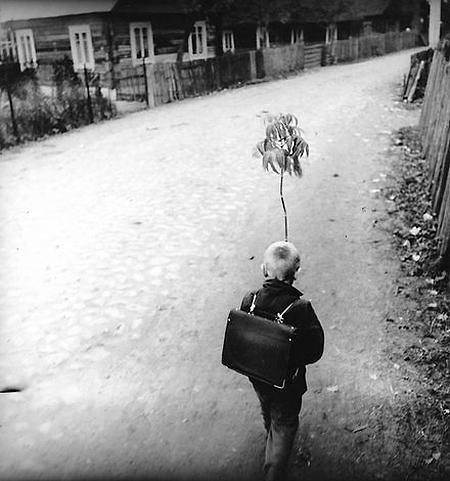
Childhood
Antanas Sutkus
1969 Life under the Soviets and after:
a photographer’s story
Masha Karp
_______________________
Mind/Body
Gregory Djanikian
How do they survive, riven
as they are, the one undoing
the other's desire?
Tell the body to outrun
the mind, and the mind smirks,
whispering too loudly
this way this way,
blocking all the exits.
And the body, luxurious
sensualist by pool side or in bed,
doesn't it hear the mind's
impatient machinery ticking
it's time it's time?
And only in our mind's eye,
as we're fond of saying,
someone else's body leaping nimbly
in jetés of thought, or revealing
to us Act V, scene iii
in one gestural flourish,
body and mind beautifully
synchronous.
Oh, the mind is eely, slipping
out of its puzzle boxes,
loving its own wit.
...(more)
Cut from the same tongue
on Gregory Djanikian's "Armenian Pastoral, 1915"PoemTalk 57 jacket2
Gregory Djanikian at the Poetry Foundation and PennSound _______________________
 John Cage
b. September 5, 1912
Enjoy yourself. It is lighter than you think.
Some Rules and Hints
for Students and Teachers or Anybody Else
John Cage
.....................................................
Events honoring John Cage at 100
Full Albums / Full-length Recordings
John Cage
ubu
Hidden harmonies in John Cage's 'Empty Words'
Dawn Akemi Sueoka Searching For Silence
John Cage’s art of noise.
Alex Ross
John Cage at EPC
"The right to be myself, as long as I live! As if I were a sound.":
Postmodernism and the Music of John Cage
Nancy Perloff
(....)
Cage’s writings, his often detailed written instructions for performance, his explanations of compositional procedure, and his musical scores, all produced during a long and prolific career (b. 1912, d. 1992), provide extraordinarily rich and varied evidence of his role as twentieth-century modernist and as source for postmodern aesthetics.
Cage moves between the seemingly oppositional contexts of postmodernism in the 1970s and 80s, and European modernism in the early twentieth century, with reference especially to the art of Erik Satie (whom Cage championed), Italian Futurism, and German Dada. Cage’s friendship and intellectual exchange with the French composer, Pierre Boulez, during the early 1950s offers a third vantage point. Although the three contexts are quite separate, stylistically and chronologically, each is integral to the evolving Cage oeuvre. Yet none entirely accounts for his radicality. Through a discussion of these comparative settings, Cage emerges as an experimentalist and an avant-garde figure who believed in his responsibility to change the world through new music....(more)
The Music of Verbal Space: John Cage's "What You Say"
Marjorie Perloff
_______________________
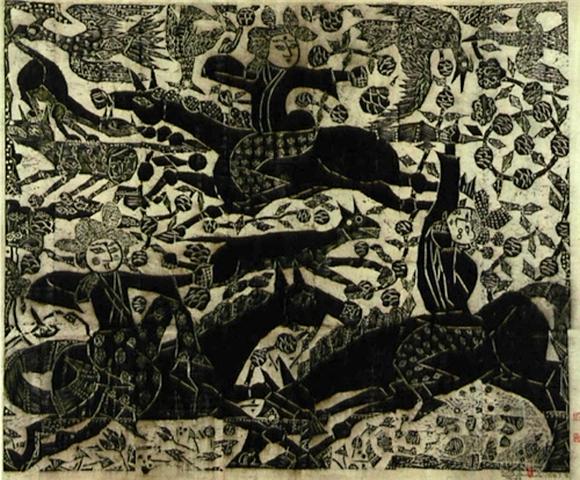
In Praise of Flower Hunting
(woodcut on paper)
Shiko Munakata
b. September 5, 1903
_______________________
Digital Arts & Humanities: Scholarly Reflections from University College Cork(PDF)
via Digital Humanities Now
_______________________
The Long History of Americans Debating Empty Chairs
_______________________
Cell phones are tracking devices that make phone calls. It's sad, but it's true.
Leave Your Cellphone at Home
Interview with Jacob Appelbaum n+1
... a big part of this is social behavior and not technology per se. And a big part of it is accepting that while we may live in a dystopian society right now, we don’t always have to. That’s the tradeoff, right? Because what is OWS working toward? The answer is, something different. And if we want an end to social inequality, the surveillance state is part of what we have to change. If we make it worthless to surveil people, we will have done this. So, it needs to be the case that what we do doesn’t hang us for what we wish to create....(more)
_______________________
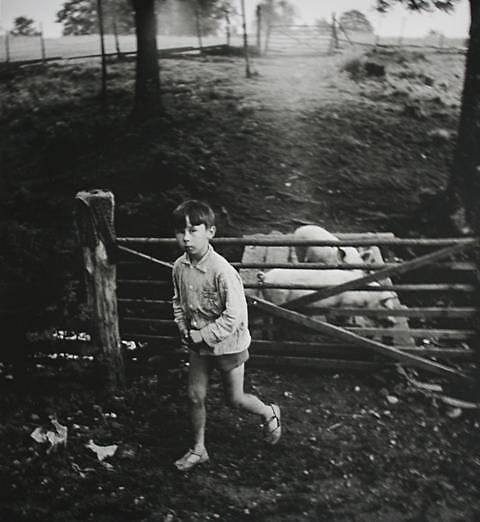
Antanas Sutkus
_______________________
Sit down, says generous life, and stay awhile!
although it's irony that sets the table
and puts the meager food on broken dishes,
pours out the rancid wine, and walks away.
- Robert Creeley: Generous Life

photo - mw
_______________________
Paradigm of the Tinctures [pdf]
Steve McCaffery
illustrations by Alan Halsey
the figure: viewed from the back
It’s the other side of Summer
in a blown-up world
behind it there’s Caspar David Friedrich
copying the paintings
of Old Masters, sturm und drang with
a pair of scissors for comfort.
What a splendid air of security!
The writing that knows the lovers of strange landscape
is hardly visible,
shivers to the shape of
a disappearing allegorical vocabulary.
Let’s go there and be read
in a morning fog
ask a tree to dance with us
in the sentence
“I have to stay alone.” Argotist Ebooks _______________________

The Hands of Antonin Artaud
Man Ray
1922
No one has ever written, painted, sculpted, modeled, built, or invented except literally to get out of hell.
-
Antonin Artaud (b. September 4, 1896)
from The Nerve Meter
Antonin Artaud
It must be understood that all of intelligence is only a vast contingency, and that one can lose it, not like a lunatic who is dead, but like a living person who is in life and who feels working on himself its attraction and its inspiration (of intelligence, not of life).
The titillations of intelligence and this sudden reversal of contending parties.
Words halfway to intelligence.
This possibility of thinking in reverse and of suddenly reviling one’s thought.
This dialogue in thought.
The ingestion, the breaking off of everything.
And all at once this trickle of water on a volcano, the thin, slow falling of the mind.
To find oneself again in a state of extreme shock, clarified by unreality, with, in a corner of oneself, some fragments of the real world.
(....)
I am the witness, I am the only witness of myself. This crust of words, these imperceptible whispered transformations of my thought, of that small part of my thought which I claim has already been formulated, and which miscarries,
I am the only person who can measure its extent.
_______________________
Always the Same Snow and Always the Same Uncle
Herta Müller
Translated from German by Philip Boehm
words without borders
(....)
I don’t trust language. I know by my own example best of all that in order to be accurate, language must always take something that doesn’t belong to it. I don’t know why verbal images are so thievish, why even the most valid comparison steals characteristics that are not properly its own. Only when one perception robs the other, when one object seizes the substance of another and claims it for its own and uses it—only when what cannot happen in reality becomes plausible in a sentence, only then can the sentence stand up to reality with a reality of its own, a reality subsumed into the word and valid as such....(more)
.....................................................
Writing from the Silk Road
Word without Borders
September 2012
_______________________

Oskar Schlemmer
b. September 4, 1888
_______________________
Why I'm Studying Sanskrit
Justin E. H. Smith
(....)
I take it as a contingent fact about world history that India and Europe developed philosophical traditions, and I take it as a contingent fact, also, that Sanskrit has been the medium for so much important philosophical reflection. To this extent, beyond the fact that my Sanskrit is terrible, there is another reason why I will probably not be winning any prizes from the promoters of Sanskrit in India any time soon: I am not saying what they want to hear about the value of this cornerstone of their cultural heritage....(more)
_______________________
UbuWeb Top Twenty - September 2012
Selected by People Like Us
_______________________
Women Who Love Republicans Who Hate Them
Katha Pollitt
_______________________

By the Seine
Louis Stettner
(1951)
12 Classic photos of Paris France
LensCulture Web Log
_______________________
Revolt of the Rich
Mike Lofgren
The super-rich have seceded from America even as their grip on its control mechanisms has tightened. But how did this evolve historically, what does it mean for the rest of us, and where is it likely to be going? _______________________
Capitalism's Ideological Crutches
Richard D Wolff
(....)
The blame-the-government ideological crutch aims to stop, deflect and demoralize political coalitions of those hurt and outraged by capitalist crises. Consciously or unconsciously, capitalism's ideologues want to prevent any repeat of what happened in the 1930s. Then, a coalition of workers, farmers, intellectuals, and others forced President Roosevelt to do the opposite of austerity. He raised taxes on corporations and the rich to pay for creating Social Security, unemployment insurance and a massive federal jobs program. A similar coalition today could return taxes on corporations and the rich back to those much higher Roosevelt-era rates. That could fund a government jobs program now like Roosevelt's, reducing unemployment now without any deficit and thus no additional national debt. It could, of course, go further and question capitalism itself.
Blame-the-government ideology aims to prevent workers' angers and resentments about their deprivations under capitalism from building effective, organized political power. That ideological crutch seeks to assure that what capitalism does to the people economically will not be undone by the people politically....(more)

photo - mw
_______________________
Although ˇi˛ek’s work can be difficult to get into at first, he is one of the most engaging and thought-provoking writers working in philosophy today, with a unique ability to get people excited about philosophy and critical theory. He is, in short, a gateway drug, and I’m the pusher.
How to Read Žižek Adam Kotsko la review of books
(....)
“Ideology” is one of those philosophical terms that has entered into everyday speech with an impoverished meaning. Much as “deconstruction” means little more than “detailed analysis” in popular usage, so “ideology” tends to refer to a body of beliefs, most often with overtones of inflexibility or fanaticism. But as Žižek argued in his 1989 book The Sublime Object of Ideology, ideology is not to be found in our conscious opinions or convictions but, as Marx suggested, in our everyday practices. Explicit opinions are important, but they serve as symptoms to be interpreted rather than statements to be taken at face value.
(....)
To find left-wing thinkers and movements simultaneously laughable and dangerous, disorganized and totalitarian, overly idealistic and driven by a lust for power is to suggest: there is no alternative. Rather than simply knocking around a poor, misunderstood academic in the public square, it is an attempt to shut down debate on the basic structure of our society. The rolling disaster of contemporary capitalism — war, crisis, hyper-exploitation of workers, looming environmental catastrophe — demands that we think boldly and creatively to develop some kind of livable alternative. Žižek can help....(more)
.....................................................
final chapter from Žižek's new book, The years of dreaming dangerously (Verso)
_______________________
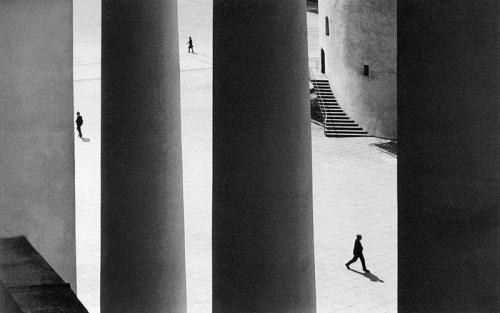
Romualdas Rakauskas
1 2 3
_______________________
Reinventing Society In The Wake Of Big Data
A Conversation with Alex (sandy) Pentland
edge
(....)
I believe that the power of Big Data is that it is information about people's behavior instead of information about their beliefs. It's about the behavior of customers, employees, and prospects for your new business. It's not about the things you post on Facebook, and it's not about your searches on Google, which is what most people think about, and it's not data from internal company processes and RFIDs. This sort of Big Data comes from things like location data off of your cell phone or credit card, it's the little data breadcrumbs that you leave behind you as you move around in the world.
What those breadcrumbs tell is the story of your life. It tells what you've chosen to do. That's very different than what you put on Facebook. What you put on Facebook is what you would like to tell people, edited according to the standards of the day. Who you actually are is determined by where you spend time, and which things you buy. Big data is increasingly about real behavior, and by analyzing this sort of data, scientists can tell an enormous amount about you. They can tell whether you are the sort of person who will pay back loans. They can tell you if you're likely to get diabetes....(more)
_______________________
We are nearing the culmination of a cunning and fanatical drive to dismantle the political institutions, the legal and statutory canons, and the intellectual and cultural frameworks that were slowly and painstakingly built over decades to protect everyday citizens from the excesses of private power. The “city on the hill” has become a fortress of privilege, guarded by a hired political class and safely separated from the economic pressures that are upending the household stability, family dynamics, social mobility, and civic life of everyday Americans.
Socrates said to understand a thing, you must first name it. As in Athens then, so in America now: The name for what’s happening to our political system is corruption — a deep, systemic corruption.
How did we get here?
- Bill Moyers and Bernard A. Weisberger
_______________________
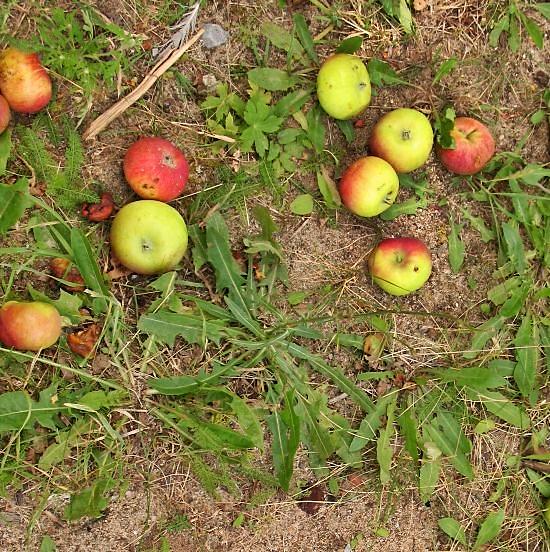
photo - mw
_______________________
Six Dutch Poets [pdf]
Pleiades
Lightning Visit
Pieter Boskma
In memoriam Czeslaw Milosz
I landed on a lily and entered the calyx
down a spiral staircase of slender smells.
Highlight of honey flowing discreetly.
And the wind that whistled between the points
that birds marked with their tenuous song
that gleamed like pearls in an early Rembrandt,
if sounds could gleam, and they did,
here they did! So in a tree there hung a whisper
of wavy gold brocade, and in the grass there trembled
the lament of a stray steppe wolf.
So here what sounded showed itself, here it did!
I sat in the calyx and buzzed
with attention to what was unfolding
under my hands: a languid silhouette
of a girl of course who was laughing
like water in summer past rocky
banks clad with exotic herbs,
and it rose like a swarm
of bees escaping the hive for the
first time, and I too was a part
of wings in the spring, climbed beyond
the possibility of being happy and saw
a fountain that rose guffawing
on a dune that just now was gloomily
drying, and saw how the lily took off its
masks and the wrinkled mug of what was
and is and shall revealed itself.
via The Page - Poetry, essays, ideas
_______________________

photo - mw
_______________________
He watches the goat tied to the biboquet. He watches it climb down the step-ladder to the roll of the drum. He smiles. There is applause. A crowd in purplish light. I ask him:
- How do you, Paul Celan, get from stammer to stutter?
- The stammer is linked to childhood, the stutter to knowledge.
- If I understand you correctly, your idea of stammer and stutter is close to Hoelderlin's idea of ideal states...
- That is...
- Hoelderlin says there are two ideals: extreme simplicity, childhood for you, and extreme knowledge, i.e. your stutter.
- Yes, the stutter is literally dumbfounded. He is 'stupid', that is to say aphasic, and we can think of Hoelderlin.
- The monkey is aphasic, therefore...
- Therefore he dances... he has seen the lightning. He is silent and dances.
from Jean Daive, Under the Dome: Walks with Paul Celan
Spurious
|
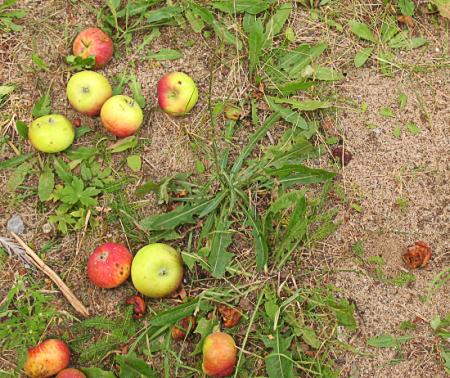
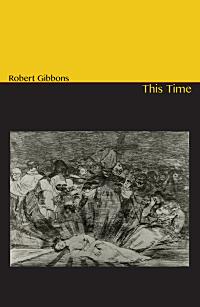
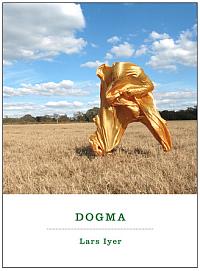








































 (....)
(....)